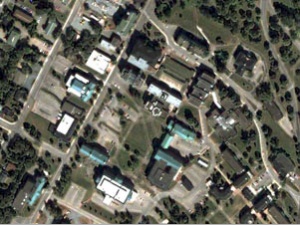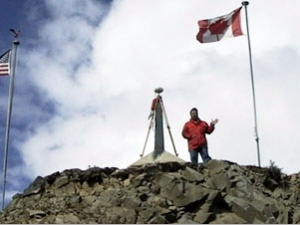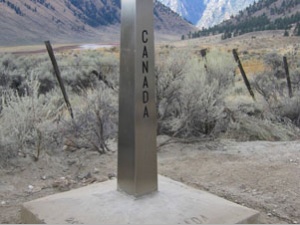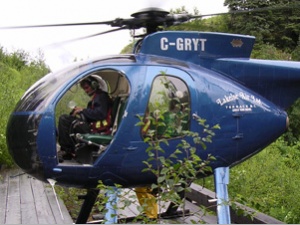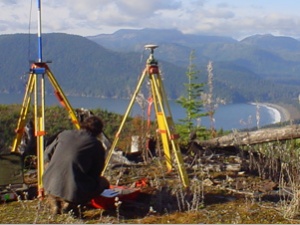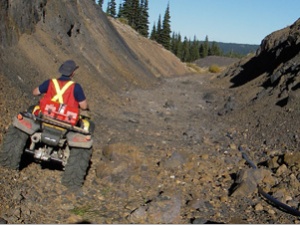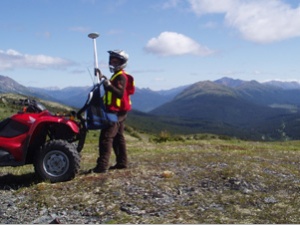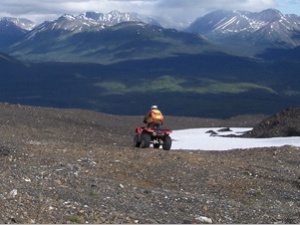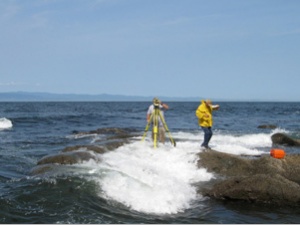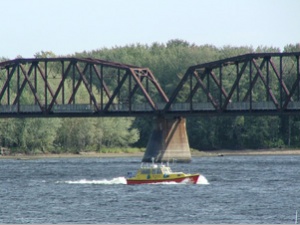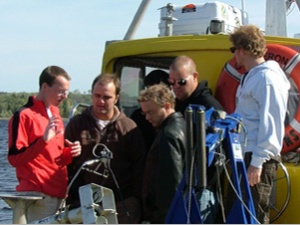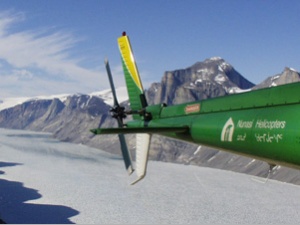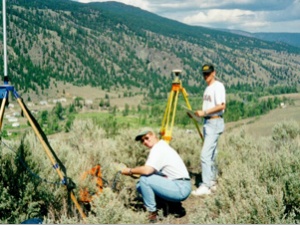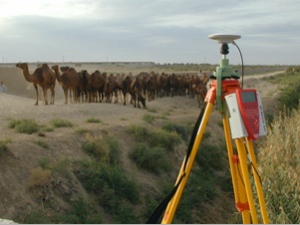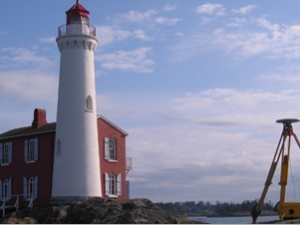what's it all about?
questions answered
Lots more info about the surveying profession … and how you can turn it into your career.
FAQs
Surveying is all about determining property boundaries and the measurement and analysis of land related information.
Whether it’s positioning a new highway for the Winter Olympics, precisely locating an oil rig for drilling on land or offshore, preparing a plan of a single home for a mortgage, or measuring and mapping large areas for a resource company or government, surveyors measure the size, position and location of things relative to the ground and to parcels of land. If someone wants to know where, how high, how big, or how far, they want a surveyor.
Surveying is part of a bigger discipline called Geomatics.
Geomatics is the discipline of gathering, storing, processing, and delivering geographic information or spatial data. What is geographic information? It’s just information that is tied to a specific location, or where something is related to the earth.
There are many specializations within geomatics, including surveying, geodesy, geographic information systems, remote sensing and digital imaging, positioning and navigation, etc.
Here are detailed descriptions of geomatics and geomatics engineering from the Government of Canada, the University of Calgary, and from the University of New Brunswick.
No. Surveyors work indoors and outdoors combining the actual measurement activities that take place in the field with the project planning, analyzing of the data collected, and producing the final product, be it a report, map or plan, in the office.
How much time you spend indoors and out will depend on your choices within the broad range of surveying careers.
Professional surveyors will spend a significant of time working outdoors in the field during their training. Most enjoy the fact that the can combine office work and work outdoors when their training is finished.
Some technician and technologist careers are primarily indoors and others are outdoors. If you work as part of a field crew, most of your time will be spent outside on the job. If you specialize in computer drafting, GIS work, or data calculation, you will work indoors.
No. Surveyors work indoors and outdoors combining the actual measurement activities that take place in the field with the project planning, analysing of the data collected, and producing the final product, be it a report, map or plan, in the office.
Professional surveyors do spend time at their desks in a variety of tasks. These include planning projects, telephoning or emailing clients, doing calculations with measurement data from the field crews, reviewing maps, plans and other documents related to the project, and other tasks like writing reports, preparing invoices, etc.
But, professional surveyors also visit clients, go to job sites, and meet with other company staff at the office and out of the office.
Professional surveyors will work with clients to plan projects and ensure that their needs are being met and the right product or service is delivered. They will also supervise and work with other staff members including field crews and office staff throughout a project. Surveyors will often meet with other professionals working on the project such as engineers, architects, lawyers, and construction site supervisors. Survey technicians and technologists will work under the supervision of a professional surveyor.
They work with all of the people on a project team including field and office staff and client representatives. Field crews will often be made up of two or three people who work closely together on a regular basis. Filed crews also interact with members of the public in other trades and professions on a regular basis, on and around the job site.
We’ve asked lots of surveyors, and the people that helped create this site are surveyors too, and almost all of the answers to this question can be summarized by two words – variety and challenge.
No two projects are ever the same; work can be urban, rural or in the wilderness; it can be in the neighbourhood, across the province, in the far north, in Canada or abroad; it can be both physically and mentally challenging; you can spend time in the office or outside; and you’ll use your problem solving skills to find the best solution for the particular task and client.
Look here for quotes and pictures from today’s professionals.
Surveyors, from technician to professional, need strong computer and math skills. They need to be able to work well with people and have good communication and problem solving skills. Surveyors often have an interest in history and real property law. Surveyors at all levels usually enjoy working outdoors.
A professional surveyor will go to university for at least 4 years to complete a bachelor degree, or will study at a college or technical institute for 2 to 3 years and then write special exams, or transfer to a university program to complete their education.
A technician or technologist will study at a college or technical institute for 1 to 3 years depending on the program.
Look here for more information about the education needed to become a surveyor.
The University of New Brunswick, University of Calgary, Laval University, Ryerson University, and British Columbia Institute of Technology have programs that are recognized to various degrees for entry into surveying at the professional level.
There are many college and technical institute programs that provide training for a career as a survey technician or technologist, and can also be a starting point for further study leading to a professional licence.
Look here for more information about the education needed to become a surveyor.
There is no one simple answer to this, when the profession is so varied.
Income and benefits will depend on your level of education, amount of experience, level of responsibility, the company you work with, and the type of work that the company does.
Your career in surveying could range from a valued technical employee in a surveying or engineering company, to the President/CEO of that company.
An income and benefit study done by the Alberta Land Surveyors Association in 2006 showed that out of 87 professional surveyors that responded, 5 made under $75,000 per year and 6 made over $300,000 per year, with the majority making between $75,000 and $175,000 per year. Technical support staff in 2006 in Alberta were working on average between 40 and 50 hours per week and making between $16.90 and $28.22 per hour. Keep in mind that in 2006 Alberta had a booming economy so these numbers would be on the high side today or in other regions of the country.
Yes! Surveyors are often busy in the summer months, especially in the construction sector, and firms often look for summer employees to assist their regular work force. Most post secondary schools that have survey programs report that their students find related work for summer or other work terms.
Several of the surveyors associations have job postings on their websites.
Job hunting experts will often tell you that many job openings are not posted, so contacting local surveying forms in your area is also a good idea if you are looking for a job. The surveyors associations have on their websites listings of survey companies and/or the surveyors, who are members of the association, and surveyors in your specific area are listed in the yellow pages.
In Canada a professional surveyor is licensed in much the same way as a professional engineer, architect, or lawyer. They have first gained a high level of education, a university bachelor degree, or equivalent. They then spend 1 to 3 years working with a professional surveyor to gain experience (this is called articling), and then write professional exams set by the surveyors association in the province or territory where they want to work.
In order to work as a professional surveyor in Canada, you must have a licence and be a member of the professional surveyors association in the area where you work. Many professional surveyors have a licence in more than one jurisdiction.
There are also many other career choices in surveying such as a technician or technologist.
Professional surveyors associations are self-governing professional associations. In Canada, that mean the government has given surveyors the right and privilege of regulating themselves. Other self-regulating professions include engineers, architects, doctors, and lawyers.
The primary responsibility of any self-governing association is to protect the public by ensuring that the people practicing the profession are qualified, competent, and ethical.
The associations set the standards for becoming licensed and for practicing the profession. They also handle complaints about their members and discipline members when necessary.
There are eleven professional surveyor associations in Canada; one for each province, and one governing the surveyors who work in the Territories and on other federally regulated lands such as offshore, national parks, and Indian reserves.
There is a surveyors association in your province that has lots of information and people that will answer your specific questions. There is also a federal association governing the surveyors who work in the Territories and on other federally regulated lands such as the offshore, national parks, and Indian reserves. Here’s a link to a listing of their websites. Send them a note or give them a call.
Surveyors are a friendly lot and many would be happy to participate in a career day, answer questions, give you a tour of their offices, or put you in touch with someone who can provide what you’re looking for. Look them up in the yellow pages, or on the surveyors association website for your area.
There are eleven professional surveyor associations in Canada; one for each province, and one governing surveyors who work
in the Territories and on other federally regulated lands such as the offshore, national parks, and Indian reserves. You can find their websites here.



